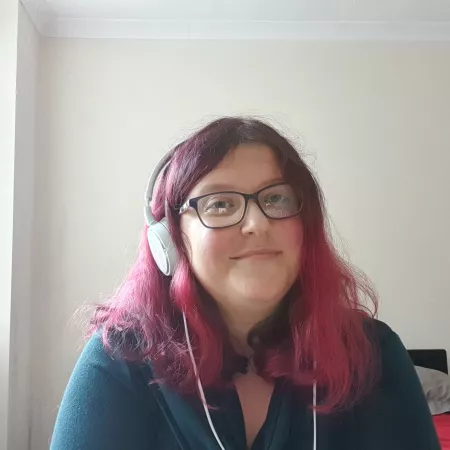
Olivia's story: Growing up with epilepsy
Olivia was diagnosed with epilepsy aged 11, and experiences uncontrolled seizures. She shares the challenges she has faced and her top tips in her blog.

As a young person with epilepsy, your healthcare transition from paediatric to adult care is something to think about, and it’s perfectly normal to hit some emotional bumps along the way.
Fear, worry and anticipation are all normal emotions during this time, but feeling confident about transition will help you navigate your way through this stage of your life. Knowledge of the process will help you formulate the right questions to ask your epilepsy doctors so that you understand what will happen, when it will happen and who you can talk to. Understanding and being part of the process will help to make your transition period as stress free as possible.
Arming yourself with information will help you discuss your wishes, hopes, fears and worries with both your family and friends and your epilepsy doctors.
To help you, here’s our guide to transition and what you can expect.
Transition means moving from one stage to another. As a young person with epilepsy, one form of transition is moving from the medical team you’ve had as a child, to a new set of epilepsy doctors who will organise your meds and care as you move into adulthood.
This usually happens between the ages of 16 and 18, but in order to make transition a smooth process, planning for it usually begins around the age of 13. Transition is a process that will be individual to you and your needs. Your epilepsy doctors will base the process on what’s best for you – there isn’t a set timeframe or a “one size fits all” approach. It will all depend on what’s right or wrong for you.
So, what does transition look like? Importantly, it’s a process, rather than one appointment with your paediatric consultant (children’s epilepsy doctor), and the next with another epilepsy doctor entirely.
Part of this process might involve you visiting an adolescent (or young people’s) clinic before moving onto an adult one. Transition is flexible and the actual process may depend on where you live in the country. But either way, your epilepsy doctors will have the following ultimate goals:
Part of the transition process involves giving you more say, and more power, in the decisions that affect your care, and ultimately, your life. While this is a great opportunity, it can feel daunting.
This is a perfectly natural concern, and we promise you that you’re not going to be left alone to deal with transition. The more your doctors plan with you, the smoother and more successful your transition will be.
Your transition might involve you starting to book your own appointments and perhaps attending with your mum, dad or other adult sitting outside. You could begin to feel more in charge as a young person by recording your own seizure diary and making a note of anything different or that you want to ask at your next appointment.
You’ll know the importance of your meds, but perhaps until now, someone else has given them to you. During transition, your epilepsy doctors may start to encourage you to take more responsibility for taking your meds at the right time. They may also talk to you about how you go about getting your repeat prescriptions.
Your doctor may also start to introduce topics that you might find embarrassing, such as dating, sex, drinking alcohol and taking drugs. So perhaps all the more reason to have your parent/carer outside.
Importantly, transition should take place over a number of years, helping to gradually empower you into becoming a confident young adult.
“I have been able to speak privately about things with my doctor/nurse rather than have a parent present.”Young person
Feeling worried and anxious about transition is completely normal. Transition can be daunting for your parents and other adults too, that until now, have looked after your appointments, meds, seizure diaries and care. They may struggle to see you off into the big, wide world.
Therefore, support is essential, and it may come to you in many different forms. Your first port of call should always be your epilepsy doctor or nurse.
Your epilepsy doctors are also perfectly placed to help make your transition smooth, and will be by your side as they begin to hand over to your new, adult team. And don’t forget friends and family. They might not think of the same questions or concerns as you, but talking to them could help you form the right questions next time you see your doctor.
Whoever we are, whatever our life experience, sometimes, change can make us feel anxious. Changing schools, moving to a different neighbourhood or joining a new sports or social group can be both exciting and nerve-wracking. We may feel those familiar butterflies, but we can also feel nervous and distracted, and we can feel fearful and upset about the unknown and unfamiliar.
Transition from child to adult health services when you’re a young person with epilepsy is no different. Seeing a different doctor in a different clinic is bound to make you feel a little bit unsettled. After all, you’ve probably been used to seeing the same faces in the same familiar surroundings for as long as you can remember.
The good thing is – all your feelings are valid. You simply need the time, support and tools to navigate it. And we’re here to support you.

Olivia was diagnosed with epilepsy aged 11, and experiences uncontrolled seizures. She shares the challenges she has faced and her top tips in her blog.

Susanna was diagnosed with epilepsy at the age of 3, and then high-functioning autism 13 years later. Her blog discusses how both of these diagnoses have impacted her life growing up.

Find out about Annie's experience of growing up with epilepsy and what she has learned from her journey.
Think about what you want from your appointments and ask yourself:
You might also find it helpful to write these questions down in your phone/notebook and take them with you. Listen with curiosity and own it - know what questions you want to ask:
Remember this is YOUR appointment. You need to be the detective and ask the questions that will help you plan your future.

What happens when you transition from paediatric to adult epilepsy care?
A space for young people, aged 13+, who are living with epilepsy, for them to share, learn and find support.